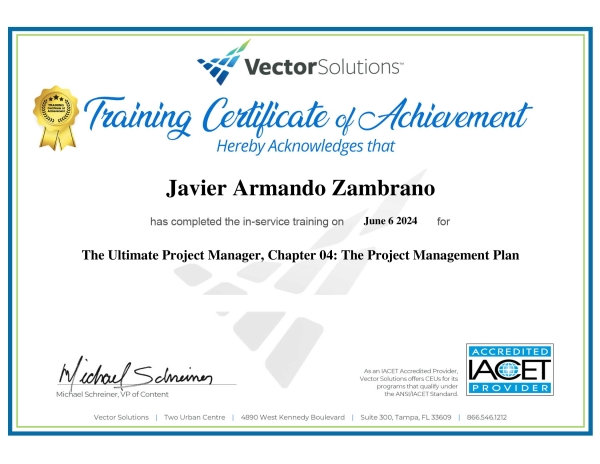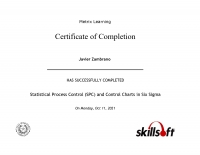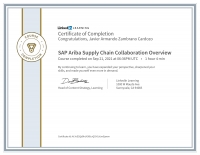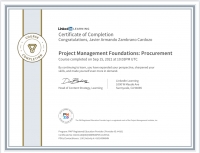Friday, 07 June 2024 14:01
THE ULTIMATE PROJECT MANAGER: THE PROJECT MANAGEMENT PLAN
Javier Zambrano
The Importance of a Project Management Plan As the project manager, you’ve been involved in all the aspects of marketing, proposal, and contract negotiation for the project. You have the final signed contract in hand that clearly indicates the scope, schedule, and price for completing the project. So why do you need a project management plan? You already have it. Wrong! You may have a scope of work, but not the sequencing plan. In addition, the scope of work usually has not been developed in the contract to the level of detail that allows the desired level of project control.…
Published in
Blog
Tagged under
Monday, 26 February 2024 17:55
PMBOK GUIDE - PLANNING PROCUREMENT FOR PROJECTS
Written by Javier Zambrano Cardozo
Published in
Blog
Tagged under
Wednesday, 27 September 2023 19:08
TOP 10 PROCUREMENT KPIs EVERY SUPPLY CHAIN MANAGER SHOULD TRACK
Javier
If supply chain management were a puzzle, Key Performance Indicators (KPIs) would be the essential pieces that help you put it all together. These metrics are your compass, guiding you through the challenging labyrinth of procurement activities. But with a plethora of KPIs out there, which ones should you focus on? I am about to unveil the top 10 procurement KPIs that will make your life easier and your supply chain smoother. Incorporating Humor into KPIs Now, before we wrap up, let's inject a bit of humor into this serious KPI discussion. After all, who said KPIs couldn't be fun?…
Published in
Blog
Tagged under
Thursday, 14 September 2023 16:48
Sustainable Procurement: Best Practices and Benefits
Written by Javier Zambrano Cardozo
In an era where sustainability is no longer a buzzword but a guiding principle, the concept of sustainable procurement has taken center stage. Today, we embark on a journey to explore the world of sustainable procurement, shedding light on its best practices and the array of benefits it brings to both businesses and the broader society. Understanding Sustainable Procurement Sustainable procurement, in essence, represents a commitment by organizations to source goods and services in a manner that considers economic, environmental, and social factors. It's more than just a box to tick; it's a strategic choice with far-reaching implications.…
Published in
Blog
Tagged under
Managing a small number of the same suppliers is relatively easy. But when you have many suppliers, and a steady stream of new ones, things can get tricky. Following is a systematic process for onboarding new suppliers without disrupting engagements with existing partners. Step 1: Develop a standard process for supply chain discovery, shortlisting and approval. Standardization allows you to leverage the experiences you have had with past and existing suppliers so you can extract optimal value from your relationships. It also minimizes the risk of choosing the wrong supplier and adversely affecting your organization’s operations. Investigate supplier reliability and scalability…
Published in
Blog
Tagged under
Sunday, 17 July 2022 00:27
Project Management Foundations - Project Management Institute (PMI)
Written by Javier Zambrano Cardozo
Project Management Institute (PMI)® PDUs/ContactHours: 3.25 LinkedIn Learning has been reviewed and approved by the PMI® Authorized Training Partner Program. This course qualifies for professional development units (PDUs).The PMI Authorized Training Partner logo is a registered mark of the Project Management Institute, Inc. National Association of State Boards of Accountancy (NASBA)® Continuing Professional Education Credit (CPE): 8.6 LinkedIn Learning is registered with the National Association of State Boards of Accountancy (NASBA) as a sponsor of continuing professional education on the National Registry of CPE Sponsors. Recommended NASBA Field of Study: Business Management & Organization
Published in
Blog
Tagged under
Monday, 18 April 2022 03:54
PROJECT MANAGEMENT, PROCUREMENT, AND PROJECT PROCUREMENT MANAGEMENT
Written by Javier Zambrano Cardozo
PROJECT According with the Project Management Body of Knowledge guide (PMBOK®), fourth edition, a Project is a temporary endeavor undertaken to create a unique product, service, or result. The temporary nature of projects indicates a definite beginning and end. The end is reached when the project’s objectives have been achieved or when the project is terminated because its objectives will not or cannot be met, or when the need for the project no longer exists. PROJECT MANAGEMENT Project Management is the application of knowledge, skills, tools, and techniques to project activities to meet the project requirements. Project Management is achieved…
Published in
Blog
Wednesday, 13 October 2021 01:47
Statistical Process Control and Control Charts in Six Sigma
Written by Javier Zambrano Cardozo
Published in
Blog
Tagged under
Wednesday, 13 October 2021 01:38
SAP Ariba Supply Chain Collaboration Overview
Written by Javier Zambrano Cardozo
Published in
Blog
Tagged under
Wednesday, 13 October 2021 01:30
Project Management Foundations - Procurement
Written by Javier Zambrano Cardozo
Published in
Blog
Tagged under
More...
Sunday, 12 September 2021 22:30
Lean Improvement Methods & Implementation Planning in Six Sigma
Javier
Published in
Blog
Tagged under
Thursday, 26 August 2021 19:48
Six Sigma Strategic Planning and Deployment
Written by Javier Zambrano Cardozo
Monday, 19 July 2021 01:59
Six Sigma Project Selection, Roles, and Responsibilities
Written by Javier Zambrano Cardozo
Published in
Blog
Tagged under
Monday, 19 July 2021 01:32
Fundamentals of Lean and Six Sigma and their Applications
Written by Javier Zambrano Cardozo
Published in
Blog













